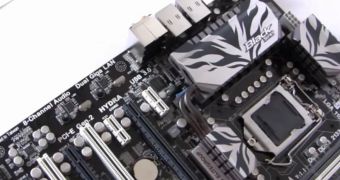According to hardware maker ECS, Intel's recently released Z68 chipset for Sandy Bridge motherboards won't have such a long shelf-life as it will be soon replaced by other, more powerful, platform controller hubs.
The statement was made by an ECS official that talked with the TechRadar publication at the Computex 2011 fair, which takes place right now in Taipei, Taiwan.
The company does have an Intel Z68 solution of its own present at the show, the Z68H2-M, but ECS doesn't plan to build too many such boards as it expects them to have a limited shelf-life.
Intel's Z68 chipset is best described as a hybrid between the P67 and the H67 platform controller hubs (PCHs), and was designed in order to fill the gap left by these two solutions in Intel's motherboard chip lineup.
As a result, the Z68 packs the best parts of the two PCH chips, including the multiplier overclocking support of the P67 and the FDI interface of the H67, which is required in order to use the Sandy Bridge on-die GPU.
Furthermore, the Z68 Express also supports an SSD caching technology, called Smart Response by Intel.
This allows users to speed up their storage system by pairing together a solid state disk with an HDD and using the former as a fast cache memory for the hard drive.
All the motherboards based on the Z68 PCH are compatible with Sandy Bridge processors and use the LGA 1155 socket.
The same socket will also be used by Intel for the upcoming Ivy Bridge processors, that are expected to arrive in March/April 2012 together with four new consumer motherboard chipsets that will include both native USB 3.0 and Thunderbolt support.
The next PCH to be launched by Intel is designed to be used together with LGA 2011 processors and is called the X79. The first motherboards based on this chipset have already been showcased at the Computex fair.

 14 DAY TRIAL //
14 DAY TRIAL //